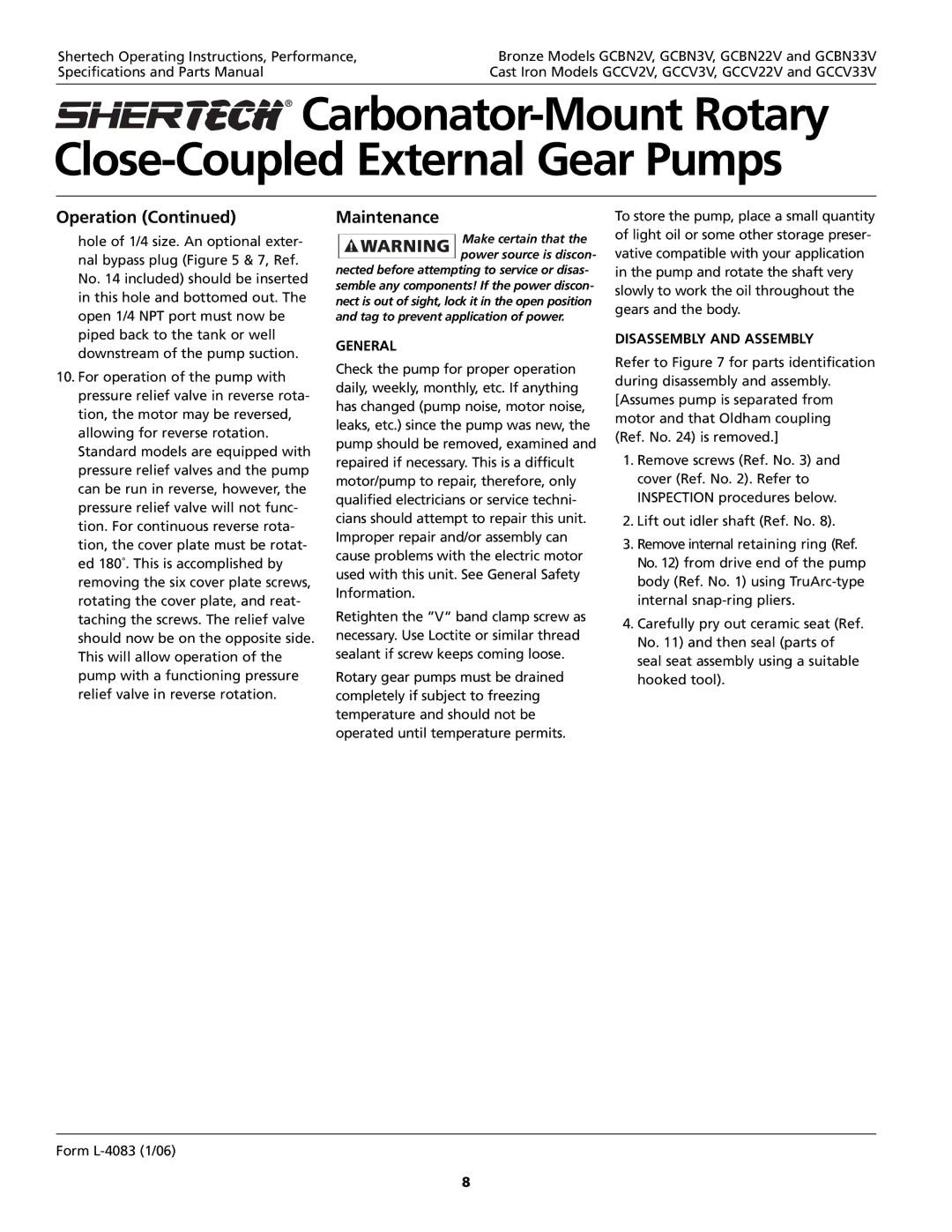
Shertech Operating Instructions, Performance, | Bronze Models GCBN2V, GCBN3V, GCBN22V and GCBN33V |
Specifications and Parts Manual | Cast Iron Models GCCV2V, GCCV3V, GCCV22V and GCCV33V |
|
|










Carbonator-Mount Rotary Close-Coupled External Gear Pumps
Operation (Continued)
hole of 1/4 size. An optional exter- nal bypass plug (Figure 5 & 7, Ref. No. 14 included) should be inserted in this hole and bottomed out. The open 1/4 NPT port must now be piped back to the tank or well downstream of the pump suction.
10.For operation of the pump with pressure relief valve in reverse rota- tion, the motor may be reversed, allowing for reverse rotation. Standard models are equipped with pressure relief valves and the pump can be run in reverse, however, the pressure relief valve will not func- tion. For continuous reverse rota- tion, the cover plate must be rotat- ed 180˚. This is accomplished by removing the six cover plate screws, rotating the cover plate, and reat- taching the screws. The relief valve should now be on the opposite side. This will allow operation of the pump with a functioning pressure relief valve in reverse rotation.
Maintenance
Make certain that the power source is discon-
nected before attempting to service or disas- semble any components! If the power discon- nect is out of sight, lock it in the open position and tag to prevent application of power.
GENERAL
Check the pump for proper operation daily, weekly, monthly, etc. If anything has changed (pump noise, motor noise, leaks, etc.) since the pump was new, the pump should be removed, examined and repaired if necessary. This is a difficult motor/pump to repair, therefore, only qualified electricians or service techni- cians should attempt to repair this unit. Improper repair and/or assembly can cause problems with the electric motor used with this unit. See General Safety Information.
Retighten the ”V“ band clamp screw as necessary. Use Loctite or similar thread sealant if screw keeps coming loose.
Rotary gear pumps must be drained completely if subject to freezing temperature and should not be operated until temperature permits.
To store the pump, place a small quantity of light oil or some other storage preser- vative compatible with your application in the pump and rotate the shaft very slowly to work the oil throughout the gears and the body.
DISASSEMBLY AND ASSEMBLY
Refer to Figure 7 for parts identification during disassembly and assembly. [Assumes pump is separated from motor and that Oldham coupling (Ref. No. 24) is removed.]
1.Remove screws (Ref. No. 3) and cover (Ref. No. 2). Refer to INSPECTION procedures below.
2.Lift out idler shaft (Ref. No. 8).
3.Remove internal retaining ring (Ref. No. 12) from drive end of the pump body (Ref. No. 1) using
4.Carefully pry out ceramic seat (Ref. No. 11) and then seal (parts of seal seat assembly using a suitable hooked tool).
Form L-4083 (1/06)
8
